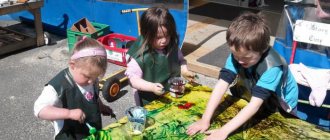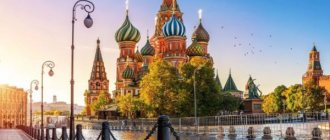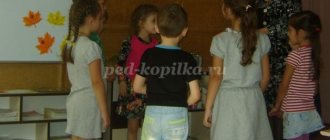Relevance.
In order for children to become true patriots of their Motherland, it is necessary to instill love and respect for their country. Moscow is part of Russia, part of the Motherland. The most important city for which our country is known throughout the world.
Talking with children, it was noticed that although the children’s knowledge about the capital is small (this is a large city in which there is the Spasskaya Tower, our president, Vladimir Vladimirovich Putin, lives and works there), the topic of Moscow is interesting for children, they want to learn about the origins and historical the past of this city, about its attractions.
In order for children to appreciate the importance of Moscow for Russia, it is necessary to introduce them more closely to the cultural value of Moscow, to its heroic past. After all, the prosperity and power of our state depends on their efforts in the future.
Problem.
Children have ideas about the main city of Russia, but this knowledge is not enough to understand the significance of Moscow - the capital for the country as a whole and for every Russian in particular.
Target:
- Stimulate children's cognitive interest in the capital of Russia - Moscow.
Hypothesis.
Attracting children's attention to studying the historical past of the city of Moscow and its cultural values will lead to a desire to learn as much as possible about the capital of their Motherland. Accordingly, with an increase in the level of knowledge, the authority of this city in the eyes of children will increase.
Tasks:
- Introduce children to the history of its origin, the heroic past and sights of the city of Moscow.
- Expand their ideas about Moscow as the capital of Russia.
- Foster love and respect for this city.
Expected result:
Children know about the history of the emergence of the city of Moscow and its formation as the capital of a large state.
The concept of the relationship between the capital and every corner of the vast country of Russia has been formed.
Children want to know as much as possible about such a distant and at the same time close city.
Project type:
- Information-oriented, creative.
Project participants:
- Children of the preparatory group for school, teacher, parents.
Project duration:
- One week (short term).
Main stages of the project implementation.
1. Preparatory stage.
- Definition of the topic.
- Studying children's knowledge and needs on this topic.
- Drawing up a plan for educational work with children.
2. The main stage of the project implementation.
Plan of educational work.
Tasks:
- Introduce children to the history of Moscow and its sights.
- Introduce children to the work of the artist A. Vasnetsov.
- Continue to compose and solve problems, analyze words according to their composition.
- Develop memory, intonation expressive speech, creativity.
- Practice orientation on a sheet of paper.
- To cultivate respect for one’s people, gratitude to ancestors, love for the Motherland and pride in it.
Activate the dictionary: City is a hero, Capital. Residence of the Government, Spasskaya Tower, Kremlin, Red Square, Ostankino Tower, University, Bolshoi Theater and other names of Moscow attractions.
Working with parents:
- Designing a newspaper with children on the theme “Moscow is the heart of Russia.
Final event: Quiz on the topic “My dear capital, my golden Moscow.”
Stage 3 is the final stage.
- Event: quiz “My dear capital, my golden Moscow.”
Topic of the week: “Moscow is the capital of our Motherland”
MONDAY: “Excursion to Red Square”
| No. | event title | Actions of children and adults |
| 1 | Morning: Individual work with a subgroup. “Which of you was in Moscow on Red Square?” | The guys answer the questions asked. |
| 2 | Didactic game: “What happens?” | Children select a noun for the original word - adjective. For example: “Main” - tower, square, capital... |
| 3 | Direct educational activities on the surrounding world. Topic: “Moscow is the capital of our Motherland.” Goal: Continue to introduce children to the main city of Russia - Moscow, to create in children a more holistic image of Moscow - the capital. Objectives: To form children’s ideas about the history of Moscow. • Generalize and expand knowledge about Moscow, about the sights of the city, learn to recognize them from illustrations. • Introduce poems, consolidate knowledge of proverbs and sayings about Moscow. • Enrich children's knowledge about individual pages of the history and culture of Moscow, people who left a mark in the memory of the people: about the origin of the name of the city, about Yuri Dolgoruky, about the Moscow Kremlin. |
|
| 4 | Walk: Observing people. | Draw children's attention to people of different nationalities, tell them that our country is multinational |
| 5 | Work on the site: “Collecting natural materials” | Competition “Whose team will fill the baskets with branches faster”, collecting fallen branches and cones |
| 6 | Mobile relay "Moscow Marathon". | Running, an element of competition. |
| 7 | 2 half day Reading fiction: Poem "Moscow". | Children listen and participate in the conversation. |
| 8 | Didactic game: “City Experts” | Children consolidate their knowledge in a conversation based on photographs of views of the city and its main attractions. |
| 9 | Independent activity: “Kremlin” | Children make collective buildings based on ideas, independently agreeing on how and what they will build from. |
| 10 | Result of the day: “Exchange of news.” | Children pass the microphone around and talk about what interesting things happened to them throughout the day. |
TUESDAY: Excursion “Monuments of Moscow”
| No. | event title | Actions of children and adults |
| 1 | Morning: Exhibition of photographs and drawings “Moscow Sights” | Conversation based on photographs and drawings, reading poetry. |
| 2 | Didactic game: “Find out by description.” | Consolidating knowledge about memorable places in Moscow. |
| 3 | Directly educational activities in drawing. Topic: "The Kremlin". Goal: To develop creative imagination in children. Tasks: Foster love and respect for memorable places. | Children choose the materials and methods of doing the work themselves. |
| 4 5 | Walk: Sky observation. Outdoor game: “Vorotsa” | The teacher tells the children that the sky is the air that surrounds our earth. People, animals, and plants breathe air. Children walk in pairs, following the rules of the game. |
| 6 | 2nd half day: Reading fiction: M. Matusovsky “To my hometown.” | The guys listen and participate in the conversation. |
| 7 | Didactic game: “We are architects.” | Children use architectural mosaics to create the Tsaritsino Architectural Ensemble - Tsaritsyn Palaces. |
| 8 | Questioning parents on the topic: “Attractions of Moscow” | They talk, fill out, answer. |
| No. | event title | Actions of children and adults |
| 1 | Morning: Didactic game “Journey along the Moscow River.” | The guys look at illustrations, pictures, photographs. Take an active part in the conversation. |
| 2 | Directly educational activities for teaching literacy. Theme "Moscow" Goal: Master the sound analysis of words. Tasks: Develop breathing and articulatory motor skills. Distinguish sounds by their qualitative characteristics. Strengthen ideas about the length of words. | Children performed sound analysis of words. |
| 3 4 | Walk: Observing the sun. Outdoor game: “Fly, jump, swim.” | Children look at the sun, talk, and conclude that the sun is a source of heat for all residents of different cities and villages. The guys name birds, animals, fish. Follow the rules of the game by actively participating. |
| 5 | 2nd half day: OZOZH: “I am a resident of the country of health.” | They look at pictures, participate in conversations, and play out situations. |
| 6 | Didactic game: "Stream" | Running, elements of competition. |
WEDNESDAY: Excursion “Journey along the Moscow River”
THURSDAY Excursion “Who works in Moscow?”
| No. | event title | Actions of children and adults |
| 1 | Morning: Conversation “Moscow professions”. | The teacher reinforces children's knowledge about professions in a conversation. |
| 2 | Didactic game: “Choose the word.” | The teacher shows the picture, and the children take turns naming the signs that correspond to the proposed object. |
| 3 | Direct educational activities on FEMP: Topic: “How many towers are there on the Kremlin wall?” | The guys create a problem on their own and use the numbers to create a solution. |
| 4 5 | Observing the work of a janitor. Labor – “Help the janitor” | A teacher with children watches the work of a janitor. Conducts a conversation about the fact that the work of a janitor is necessary for people and nature in different cities (Balakovo, Moscow, etc.)? Children help the janitor remove branches on the territory of the kindergarten. |
| 6 | Outdoor game: “Listen - dance.” | The boys perform dance movements. |
| 7 | 2nd half day: Reading fiction: Proverbs about Moscow. | Listen, participate in conversation, memorize proverbs. |
| 8 | Design of the folding book “Moscow professions” | Children come up with a short story about their favorite professions and draw an illustration for it. The finished works are combined into one book and they come up with a title themselves. |
FRIDAY: “Excursion to cultural places of the capital”
| No. | event title | Actions of children and adults |
| 1 | Morning: Didactic game: “Foreigner”. | Consolidating knowledge about Moscow and the Motherland. |
| 2 | Directly educational activities on design. Topic: “Moscow streets” Goal: Continue to teach children to compose a plot composition according to a pre-designed scheme;
| Children make buildings according to their imagination, independently agree on how and what they will build from, supplement them with toys and play with them. |
| 3 4 5 | Walk: Observation of stones. Work “Collect pebbles” Buildings made of snow “Walls of the Kremlin” | The children get acquainted with the variety of stones and their properties. The teacher reads out the poem “Diamond Mountain.” Competition “Whose team fills the box with pebbles the fastest”, collecting pebbles. Children make snow buildings. |
| 6 | 2nd half day: Reading Irina Pivovarova’s story “We went to the theater.” | Children listen, talk, and make sketches of their favorite episodes from the story. |
| 7 | Quiz “My dear capital, my golden Moscow.” | Guessing a crossword puzzle to consolidate acquired knowledge about Moscow. |
| 8 | Summary of the week: Newspaper “Moscow – the heart of Russia”. | Children and parents designed the newspaper. |


